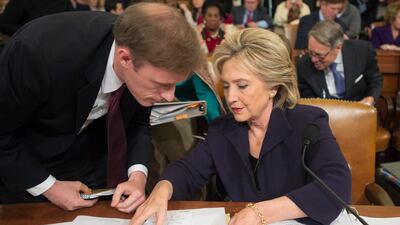President-elect Joe Biden said on Monday that he would appoint Jake Sullivan, who helped to negotiate the Iran nuclear deal under the administration of Barack Obama, to serve as his national security adviser when he takes office in January.
The appointment indicates Mr Biden is still hoping to fulfil his campaign pledge of re-entering the nuclear accord and lifting sanctions on Iran, should Tehran return to compliance with its end of the deal.
This is not Mr Sullivan’s first time working for the president-elect. While he was vice president, Mr Biden chose him to serve as his national security adviser from 2013 to 2014.
In that time, Mr Sullivan and several other Obama administration officials held secret talks with Iranians in Oman to begin the negotiations that led to the nuclear deal, from which President Donald Trump withdrew in 2018.
He also served as one of Mr Biden’s key foreign policy advisers in the 2020 presidential campaign.
In that capacity, he told an online event with the Democratic Majority for Israel advocacy group that Mr Biden would like to “negotiate a follow-on agreement” with Iran to advance US and Israeli security.
Any sort of re-entry to the nuclear accord would be hard to sell to Israeli Prime Minister Benjamin Netanyahu, who lobbied US legislators to sink the deal under the Obama administration and repeated his opposition to US re-entry on Sunday.
But Mr Sullivan’s national security record extends well beyond Iran.
He entered the Obama administration as the deputy chief of staff and director of policy planning for former secretary of state Hillary Clinton.
The Biden transition team said Mr Sullivan “played a key role in the US-brokered negotiations that led to a ceasefire in Gaza in 2012”, while helping to shape the Obama administration’s Asia-Pacific rebalance strategy.
He also emerged as an early champion of arming Syrian rebel groups in the war against President Bashar Al Assad.
And he pushed for the US-led Nato intervention on behalf of the Libyan opposition, which helped to oust Muammar Qaddafi.
As the Libyan security situation devolved, Mr Sullivan was among the State Department officials who congressional Republicans grilled as part of their lengthy probe into the 2012 attacks on the US consulate in Benghazi, which killed four Americans.
While Mr Sullivan’s close ties to Ms Clinton embroiled him in many of her political controversies, such as her use of a private email server, it also helped to propel him to power in Washington’s foreign policy establishment.
He served as the deputy policy director in Ms Clinton’s 2008 presidential primary campaign before going on to do debate preparation for Mr Obama.
He became Ms Clinton's chief foreign policy adviser during her 2016 presidential campaign.
During the Trump administration, Mr Sullivan became a senior fellow at the Carnegie Endowment for International Peace and co-founded National Security Action, a non-profit advocacy group that became a haven for former Obama administration officials.
He grew up in Minneapolis, Minnesota, and was a Rhodes Scholar at the University of Oxford, where he obtained his master's in philosophy in international relations.
Mr Sullivan also obtained a juris doctor's degree from Yale Law School.


